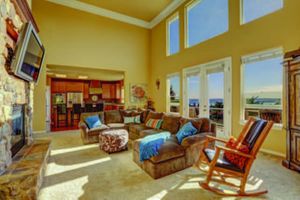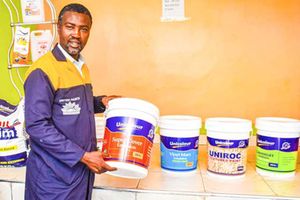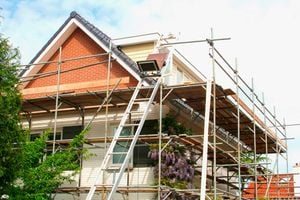
Ken Kariuki CEO of Seven Twenty Holdings at his workshop manufacturing finials.
As Kenya's real estate sector continues to grow, demand for locally produced building materials has gone up too. This is what Seven Twenty Holdings has capitalized to, responding to this need by specifically manufacturing for this industry.
The business was co-founded in 2014 by two engineers, both graduates of the University of Nairobi’s School of Engineering. Ken Kariuki, the CEO, explains that the business aims to address specific local demands in the expanding real estate sector.
“The business began as a modest venture inspired by the desire to apply our engineering skills to create opportunities for ourselves and generate employment,” he explains.
Initially focused on crafting intricately shaped metallic products, the company pivoted in 2019 upon identifying a gap in the market for curtain rods and accessories, leading to the launch of the Executive Curtain Rods brand.
“Before our establishment, the Kenyan construction sector faced challenges due to a lack of high-quality, locally manufactured accessories, relying heavily on imports that resulted in high costs and supply chain vulnerabilities. Recognising this gap, we dedicated our efforts to producing locally manufactured items,” he says.
Welding machine
With an initial capital investment of Sh30,000, they bought a welding machine for Sh10,000 and a table grinder for Sh5,000, allocating the remainder of the capital for raw materials and other expenses.

Some of the curtain rod brackets that Ken Kariuki, CEO of Seven Twenty Holdings, makes in his workshop.
This initial funding stemmed from savings accumulated through their small tea leaves business. One of the primary challenges they faced was the need to balance reinvesting modest profits for business growth with personal financial obligations.
The company’s inaugural product was the Juakali wall bracket. Made from steel and enhanced with powder coating technology, they sold it in Nairobi’s Gikomba area and various hardware stores. Its design won the day, and contributed to the company’s expansion. In 2017, they introduced powder coating service, and by 2019, they expanded their product line to include powder-coated curtain rods and their accessories. Later, in response to customer feedback, they entered the premium decorative paint industry.
The Executive Curtain Rods brand has become a significant market player, serving both end consumers and leading hardware stores nationwide that previously depended on imports mainly from Asia.

Ken Kariuki CEO of Seven Twenty Holdings, with some of his workers display some of the products that they manufacture at his workshop.
Currently employing 30 staff who play a vital role in the company’s growth, particularly in manufacturing, operations, and product development, their expansion has been fuelled by increasing market demand, allowing the company to effectively manage a growing volume of orders.
The company offers a diverse product portfolio tailored for two primary client segments: homeowners and hardware stores. For homeowners, it provides the supply and installation of curtain rods, as well as painting services via the Set Paints brand for both residential and corporate projects. For hardware stores, the company supplies curtain rods, accessories, and window and door furniture. Its product range includes furniture pipes and caps, finials, rings, brackets, tiebacks, door handles, window sliders, window stays, window fasteners, butterfly hinges, and saddle clamps.
In differentiating itself from international competitors, the company emphasises brand authenticity and national identity, promoting its status as a local manufacturer and supporting the "Buy Kenya, Build Kenya" initiative.
Its products are tailored to local preferences, with customisable options like curtain rods for angular windows. He explains that they primarily did not consider producing curtain rods for custom window shapes, such as angular, curved, and L-shaped designs, however, due to client inquiries for such products, they collaborated with their design team to develop a solution.
Initially, rods were manually curved, but as demand grew, the company became known as the go-to provider for custom curtain rods. This led to an investment in machinery to automate the process, standardise the product, and increase production capacity.
Like many businesses, Seven Twenty Holdings faces significant challenges in the manufacturing industry. One major issue is the difficulty in finding skilled personnel who are experienced with their specific machinery.

A curtain holder manufactured by Seven Twenty Holdings.
Kariuki points out the need for vocational training institutions to align their curricula with industry requirements. To address this skills gap, the company has made substantial investments in training and capacity building for their production team.
Sourcing raw materials, especially imported components, presents challenges related to reliability and availability, which can disrupt production capacity.
They also face competition from lower-priced imported curtain rods from China. In the paint sector, Set Paints struggles to compete with established Tier 1 brands that dominate the market, as he says that consumers tend to prefer these well-known options, making it difficult for new entrants to establish trust.
Recycling waste
“We are committed to enhancing our capacity in Environmental Sustainability and Governance (ESG), with our team playing a pivotal role in this initiative. We are focused on recycling waste from our metal and chemical processes and are in advanced stages of developing a system to convert waste metal into reusable sheets for production,” he states.
Recently, Seven Twenty Holdings established an R&D department to drive product innovation and diversification in growth.
“Through this initiative, we aim to develop and introduce new products to the market. This focus aligns with our broader plan for market expansion, starting with solidifying our presence in Kenya before exploring opportunities in the East African region and beyond,” he says, adding that they are also implementing a distributorship strategy and actively seeking partners.
In contributing to the resilience and growth of Kenya’s manufacturing sector, he emphasises a collaborative approach and acknowledges they have actively partnered with key institutions, such as Technical and Vocational Education and Training (TVETs), the Kenya Association of Manufacturers (KAM), and the Micro and Small Enterprises Authority (MSEA).

These partnerships enable them to advocate for favourable policies and create a supportive environment for manufacturing. By engaging in sector forums and sharing insights with other SMEs, the company aims to foster a collaborative industry network. “Our involvement with industry associations allows us to influence policy and regulatory changes that benefit the broader manufacturing sector,” he notes.
Continuous growth
Innovation is crucial in today’s environment. “To ensure continuous growth, we are committed to innovating our production processes. By embracing new technologies, we enhance our operations and set a benchmark for industry practices,” Kariuki states.
This focus on innovation not only helps maintain their competitive edge but also contributes to the overall advancement of the manufacturing sector.
He has advice for incoming entrepreneurs in this sector, emphasising three key areas: people, processes, and systems.
“Manufacturing has great potential to address Kenya's unemployment crisis, and success hinges on collaboration and efficiency. Invest in your workforce, streamline your processes, and implement systems that support productivity,” he advises.
To adapt to changing market demands, the company employs a customer-centric approach and actively engages with stakeholders to gather insights on trends and preferences in the decorative paint and curtain rod sectors. This feedback informs ongoing product development and innovation.
Kariuki notes the importance of compliance with government regulations, stating, “Following these guidelines not only ensures smooth operations but also positions us as a trustworthy player in the industry.”
Recognising the need to stay at the forefront of evolving technologies in Africa's manufacturing sector, the company is focusing on forging technology to enhance product diversification and structural integrity through the formation of metals into various shapes.
“CNC lathe technology plays a crucial role in producing curtain rods and decorative accessories, enabling intricate designs with high precision. This technology automates processes like cutting and drilling, improving efficiency and minimising waste while ensuring high-quality standards,” he explains.
Looking ahead, the business aims to leverage its Kenyan success for expansion into other African markets.






